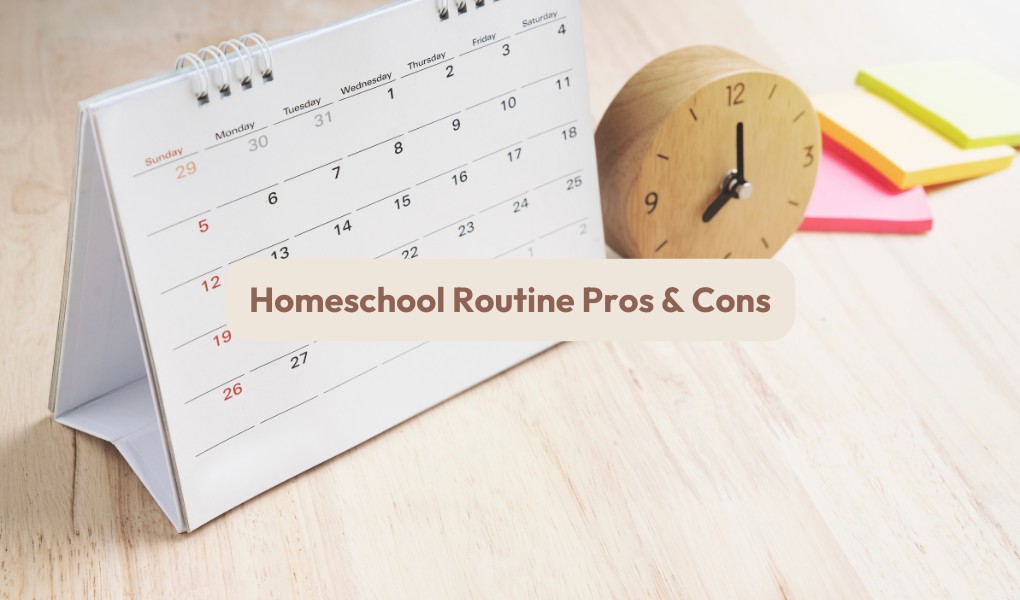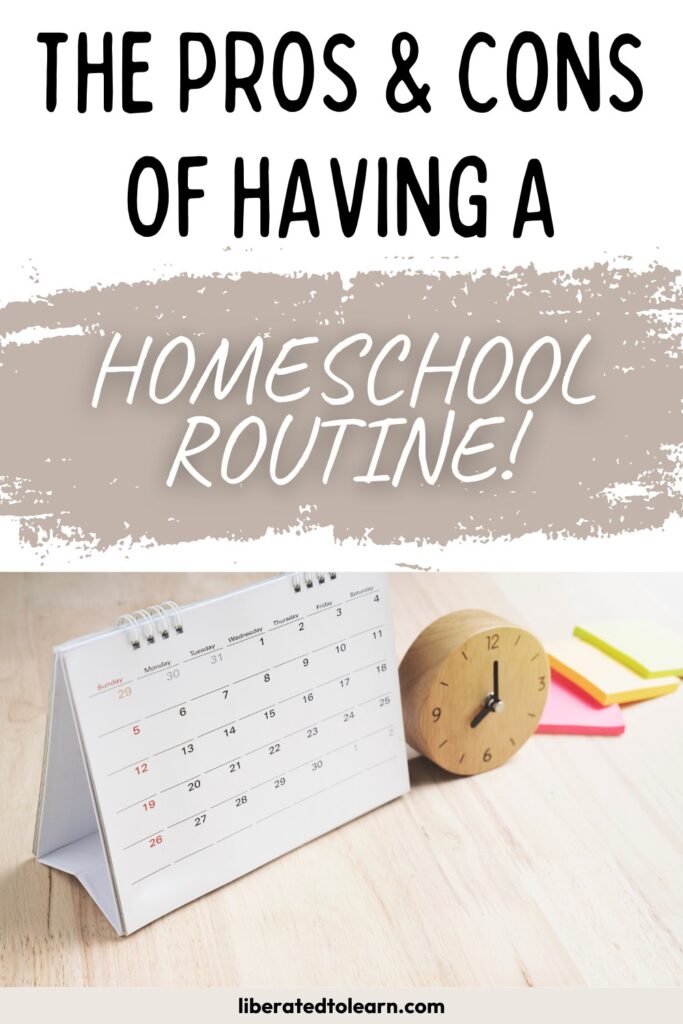Have you ever thought about whether having a homeschool routine actually matters? Does it really make that much difference? You’re probably not alone.

Contents
Have you ever thought about whether having a homeschool routine actually matters? Does it really make that much difference? You’re probably not alone.
There are those that thrive off of routine and those that love going with the flow and having complete flexibility. And then there are those that are somewhere in the middle—those who aren’t really sure whether they should have a homeschool routine or not. You might be one of these people.
For some of us, it may be the case of having not found the right routine yet, or not knowing where to start. For others, a routine might not seem as appealing but may actually help. Because of the shift from traditional education to homeschooling and their differences in terms of flexibility, it’s not unusual to wonder if a routine would be more beneficial or not.
To make things easier and to help you work out if you should have a homeschool routine and if it will make a difference, in this post we’re going to dive into the pros and cons of having a homeschool routine.

Should I have a homeschool routine?
The answer to this question often comes with finding out for yourself. You won’t actually know if one works for you unless you try it out. That said, if the idea of a routine puts you on edge or makes you feel stressed out, then you don’t have to enforce one.
What’s important to remember is that a homeschool routine can be flexible—you create it, after all. And you can create one that works for your family, whether you enjoy a lot of structure or like to have a bit more freedom and flexibility.
So, let’s get into the pros and cons of a homeschool routine before deciding if having one actually matters.
Pros of a Homeschool Routine
1. Consistency and Stability
If you’d like to provide your children with a sense of predictability and security, then a routine does just that. Knowing what to expect each day can reduce anxiety and create stability for your family. Say goodbye to the days where you have no idea what you’re doing or feel lost in the chaos of it all—a routine will solve it for you!
2. Time Management
Even if you’re not the most organised or punctual, a well-planned routine will help you to allocate your time effectively, whether it’s across subjects or your daily activities. This means that you won’t have to stress about essential learning goals because they will easily be met without feeling rushed or neglected.
3. Establishes Good Habits
Routines are perfect for creating good habits. Let’s be honest, it’s hard enough creating a habit, let alone sticking to one.
4. Parental Guidance
For homeschooling parents, a routine serves as a guide for structuring the day. It helps balance teaching responsibilities with other tasks, making the overall experience more manageable and less stressful.
5. Enhanced Focus and Productivity
A routine definitely helps with minimising distractions because it gives you something to focus on throughout the day. It also sets clear expectations for learning time, leading to more productive use of the day.
6. Balance tasks and topics
A homeschool routine is great for balancing the tasks and topics that you need and want to get done. You can ensure that all subjects are covered systematically, preventing any areas from being neglected. And you can maintain the right balance between learning, extracurricular activities and personal time.
7. Time for Extracurricular Activities
Having a routine means that there is always time for sports, arts and any other interests.
8. Parental Work-Life Balance
Whether you work from home or not, the perk of a routine is being able to balance homeschooling alongside your professional responsibilities. You’ll find that you’re able to plan and manage time a lot better for the entire family.
9. Discipline and Responsibility
Following a set routine teaches children discipline and responsibility. They learn to manage their time effectively and understand the importance of commitment to their tasks.
10. Inclusivity of Varied Learning Styles
A well-planned routine can incorporate different teaching methods and learning styles, which means that no matter what type of learner your child is—visual, auditory, or kinaesthetic—they will have their needs met.
Cons of a Homeschool Routine
1. Loss of Flexibility
A strict routine can limit the flexibility that homeschooling is known for, which means that children are not naturally able to go at their own pace or able to follow spontaneous interests or activities and learn from them.
2. Natural Learning
Under a routine, children are more limited from learning naturally and taking advantage of spontaneous opportunities. However, an unschooling or child-led approach sees the advantage of children freely being able to explore their interests organically, without a strict schedule in place.
3. Individual Needs
We all know that children have varying learning styles and rhythms. So, what works for one may not work for another, and being too rigid with a homeschool routine can overlook these individual differences.
4. Increased Pressure
Rigid schedules can create a lot of pressure and stress for both parents and children, especially when knowing that they’ve got to stick to certain plans.
5. Potential for Burnout
Keeping track of a schedule or having to manage routines can become very monotonous and a lot of parents may experience burnout. It’s not just deciding what to do every day, but also maintaining the routine that takes time and effort.
6. Difficulty in Adjusting
Children who are used to a very structured routine may find it challenging to adjust to changes or less structured environments in the future.
7. Neglect of Individual Pacing
A one-size-fits-all routine may not accommodate the varying paces at which different children learn. Some may feel rushed, while others may become bored.
8. Parental Burden
Creating and maintaining a routine requires significant effort from parents, who must plan lessons, activities, and breaks meticulously. No doubt, this can be time-consuming and exhausting.
9. Interference with Family Dynamics
Strict adherence to a routine can sometimes interfere with family dynamics and the natural flow of home life, causing friction or resentment.
10. Over-structuring the day
Routines are all about having structure, but over-structuring the day can leave both parents and children feeling overwhelmed because of doing too much.
Finding a Balance
The key lies in finding a balance between structure and flexibility, so here are some tips which might help:
- Create a framework: Establish a loose structure or framework that outlines daily goals and activities while also allowing room for spontaneity and exploration.
- Monitor progress: Regularly assess your child’s progress and adjust the routine as and when needed. Flexibility ensures that you can adapt to changing educational needs.
- Incorporate variety: Integrate a variety of learning experiences, from outdoor activities to hands-on projects, within the routine to keep education engaging and dynamic.
While the debate over homeschool routines continues, one thing remains clear: the effectiveness of a routine largely depends on the needs and preferences of the child and family. Some children thrive with a structured daily plan, while others may benefit from a more fluid approach. Ultimately, the goal of homeschooling is to provide a nurturing environment where children can learn and grow at their own pace. Whether or not you choose to implement a routine, the most important factor is ensuring that education remains a positive experience for your child.
So, there’s no right or wrong answer or a definitive yes or no when deciding if having a homeschool routine actually matters. But hopefully knowing the pros and cons of a routine can help you decide whether one will work for your family. The best part about homeschooling is that you can always give things a go and find out for yourself!
If a homeschool schedule sounds like your kind of thing, check out: How to Create the Best Homeschool Schedule!

m@liberated
Want more from Liberated to Learn?
Subscribe to stay updated about new posts, resources and giveaways!












